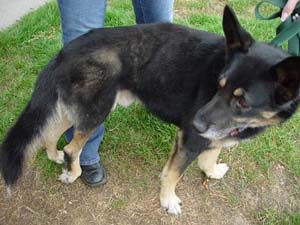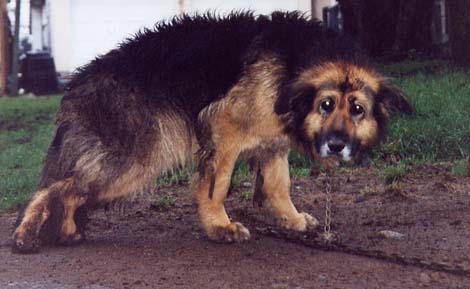|
THE SPCA
SELLS SICK ANIMALS - "AS IS"
Posted By: Jennifer
Dickson, Okanagan Animal Welfare Foundation
Date: Saturday, 27 March 2004, at 12:58 p.m.

Last Saturday Dot was sold by Surrey SPCA to a breed rescue group
for ninety dollars. Dot was purported to have kennel cough, yet she
was not in isolation. Dot's eyes were crusted with dried green pus,
and purulent green discharge oozed from both nostrils. Dot is blind
in one eye and has ten percent vision in the other. She does not
produce enough tears to lubricate her eyes.
The SPCA had Dot spayed, but no medication had been given to
treat her eyes. Her poor little face hadn't even been wiped. The
simplest of things, like wiping a little sick dog's oozing face
before it becomes encrusted and painful, hadn't even been done.
Dot was sold with an antibiotic for her kennel cough. The
antibiotic was dispensed by the SPCA, not the vet, and the dosage
recommended by the SPCA was three times too high for a dog Dot's
size.
Once in rescue, Dot went straight to the vet and had her eyes
checked. She is now on expensive eye medication, and she will be for
life, but she is worth it. She is also on a hypoallergenic diet for
her skin. She has been groomed, and cleaned, and properly medicated
in the capable and caring hands of rescue, and she is one happy,
lucky little blind dog today.
Surrey SPCA declined to give breed rescue a little black cocker
spaniel that day, saying that a wonderful home was waiting to adopt
her. On Tuesday March 23, Surrey SPCA euthanized six dogs because of
kennel cough which the SPCA gave to them. The little black cocker
spaniel was one of them.
Billie: Hide or
Perch Or...Sit in Your Dirty Litterbox at the SPCA Because Your Cage
is so Tiny That You Have No Other Options *PIC*

Posted By: Jennifer
Dickson, Okanagan Animal Welfare Foundation
Date: Saturday, 27 March 2004, at 1:04 p.m.
Billie spent two months squished into a tiny stainless steel SPCA
cage. The average size of SPCA cat kennels that we have observed is
roughly two feet long by two feet deep by two and a half feet tall.
Some may be a little bigger, but not by much.
By the time Billie, the Hide and Perch box, and the litter box
were put into that tiny cage, she had nowhere to sit but in her
litter box. She spent two months there.
By the time she was adopted, her underside was caked with feces,
and her perianal area was grossly swollen and reddened. Her new
owner took her immediately to a vet, who gave her an injection for
pain and applied local anaesthetic directly to the area to ease the
discomfort. Antibiotics were dispensed for perianal and skin
infection.
Cats kept in cages at SPCAs are limited to only four behaviour
options: They can hide in their scientifically designed and slickly
marketed cardboard "Hide and Perch" box, or they can perch on it,
with their little heads crammed up against the ceiling of their tiny
cage, or they can pace back and forth on the little six inch runway
left at the front of the cage, stopping only to stick their legs out
of the front bars as far as they can possibly reach, and meow in
desperation at anyone who will listen...or they can sit in their
litterbox covered in their own urine and feces until the SPCA sells
them or kills them.
Selling Sick
Animals: Felicity: Another SPCA Survivor *PIC*

Posted By: Jennifer
Dickson, Okanagan Animal Welfare Foundation
Date: Saturday, 27 March 2004, at 1:19 p.m.
Felicity was rescued from an interior SPCA branch with a severe
case of feline Calicivirus. We were told by the SPCA that she was
only drooling because she was stressed. Felicity was sent out with
no medication, only a sheet of instructions on how to care for
feline upper respiratory disease. We were told to use q-tips to wipe
her nose. We were told NOT to take it upon ourselves to take
Felicity to a veterinarian.
Of course we did take Felicity straight to the vet, and with
proper veterinary treatment she is finally rallying, but it has
taken weeks to get her back on her feet and eating on her own.
Felicity is 3lbs underweight. She was healthy when brought into
the SPCA as an owner surrender. She was in the SPCA for less than
two weeks, just long enough to stress her out and enough to make her
sick. It is a "miracle" that she survived the disease-filled SPCA.
Posted By: Jen Dickson
Date: Monday, 17 November 2003, at 7:01 p.m.
Because the BC SPCA has no policy that limits the surrender of
unwanted animals, it is inundated daily with more animals than it
can ever hope to properly help.
We have been told countless stories of sick dogs and cats, sold
without having been examined by a veterinarian, sold with
unaddressed medical needs, sold to people who cannot afford to
address these medical needs, sold with instructions that the buyer
take the animal right away to a vet for treatment, yet with no
followup to ensure the buyer complies, some sick animals sold for a
dollar, or sold two for the price of one.
Instead of limiting its intake so that it can truly help every
sick animal it decides to "speak for", it chooses to select only a
handful of the hundreds it receives, and use these few as
fundraising causes and tools to improve public relations, and lets
the rest take their chances.
We have been told of many examples of sick animals that the SPCA
has shuffled off without treatment.
There is Toby the old black cocker spaniel, who
arrived at Victoria branch on a Saturday, and went out Sunday, his
chronically bad ears unseen and untreated by a vet. And Sally, a
senior spaniel mix, came into Victoria SPCA with no medical history.
No senior staff even looked at her, and she went out the door for
free, in need of dental work. (Read full story below)
There is Ginger, a senior lab cross, who arrived
at Victoria branch on Oct. 9th. Despite the fact that her teeth were
bad, and she was an older dog, she still had not been seen by a vet
by the time she was sold, on Oct. 24th. (Read full story below)
Bonnie and Rascal were sold as two for the price
of one by Victoria SPCA, as they were older dogs, and Rascal in
particular was in desperate need of dentistry. The SPCA sold them to
a person on a fixed income who could not afford to address their
medical needs. Months later, with no followup call from the SPCA to
check on whether the required vet work had been done, Rascal and
Bonnie still had not received the veterinary attention that the SPCA
had told their new owner to take care of. (Read full story below)
Goldie was a sweet, sweet dog and she did not
deserve to be made to suffer. She did not deserve to be sold from
the shelter, rehomed, scared to death in the pound three times and
finally treated when it was too late. She did not deserve the cruel
treatment she received. She was surrendered for euthanasia for a
reason and her needs should have been respected then. The Victoria
SPCA had the obligation to either make her medically sound or
euthanize her. (Read full story at "The Unhappy Story of Goldie -
sold by the SPCA"
http://www.animaladvocates.com/unhappy-ending-goldie.htm
Three cats, Winston, Chief, and Jasper were "rehomed'
in seriously ill condition. Two got lucky - one didn't. (Read their
stories below)
All these animals were received, warehoused, then sold by the
SPCA. None received the medical attention they needed while property
of the SPCA. Yet Craig Daniell stated on CTV news November 3rd : "As
long as I'm here with the Society animal care is going to be my main
priority."
Mr. Daniell can't be in all places at all times, and he can't
know firsthand about the condition of each animal at his "shelters".
But what he can do is stop talking about miracles happening every
day in his branches, and start directing his staff to do the work
required for the animals in their charge so that statements about
animal care being the main priority don't sound quite so ludicrous
to those of us who visit the branches frequently, and see what
conditions are really like.
What is worse though, is that the SPCA routinely picks one animal
out of the hordes that it neglects to treat, and uses this animal as
a poster child for SPCA caring in order to raise money.
Take Nanook, for example. Nanook is a shepherd
mix with a mangled hind leg. Nanook's owner had allowed the dog to
live this way for at least eight months, in fact, he admitted to the
vet that he had done this to Nanook's leg with a 2x4. The vet gave
Nanook to the Victoria SPCA, thinking it would investigate the owner
for cruelty. The Victoria SPCA returned Nanook to his owner, damaged
leg still unattended.
Only when it looked like this story was going to get out did the
SPCA get Nanook away from his owner again, and now he is being used
as a shameless appeal for money.
This is NOT making animal care the "main priority", and Mr.
Daniell needs to put a leash on some of his staff, or they will be
the undoing of his Society.
See how the SPCA markets Nanook's misery:
http://www.spca.bc.ca/victoria/dogs/nanook.htm
So how is it that Nanook gets promoted, while a hundred others are
shuffled out without a penny spent on them? Is there a spinning of a
bottle or a drawing of straws? Or is it the threat of public
exposure that forces the SPCA to do for a select few animals what
Craig Daniell claims it does for all of them? The threat of public
exposure didn't only get Nanook a ticket to surgery on his leg. It
also got Rascal and Bonnie's teeth cleaned.
But the SPCA would not be in this terrible mess if only it would
limit its intake to a number of animals that it knows it can truly
save. Limited surrender: don't take on what you can't honestly
rescue.
Jennifer Dickson
Animal Advocates Society of BC
Research Co-ordinator
Nanook....

Selling sick pets:
Chief *PIC*
Posted By: Jen Dickson
Date: Monday, 17 November 2003, at 7:31 p.m.
In Response To:
Selling sick pets *PIC* (Jen Dickson)
Kamloops SPCA at least took Chief, a cat with serious trauma to
one eye, to a vet for an exam, and obtained some ointment to be put
in the eye. But two months later, Chief's eye had shown no
improvement, and he was in quarantine for upper respiratory disease,
when he was sold, for a dollar. Chief's new owner took him to the
vet immediately for treatment, and within 48 hours the affected eye
was showing significant improvement. The vet had been concerned that
chief would lose the eye, but under his new owner's faithful
treatment, his eye will be saved.
-
Selling sick pets: Toby and Sally *PIC*
Carol Sonnex -- Monday, 17 November 2003, at 7:14 p.m.
-
Selling sick pets: Rascal and Bonnie *PIC*
Carol Sonnex -- Monday, 17 November 2003, at 7:25 p.m.
-
Selling sick pets: Winston
Jen Dickson -- Monday, 17 November 2003, at 7:28 p.m.
-
Selling sick pets: Jasper *PIC*
Jen Dickson -- Monday, 17 November 2003, at 7:33 p.m.
-
Selling sick pets; Ginger *PIC*
Carol Sonnex -- Monday, 17 November 2003, at 7:40 p.m.
-
Selling sick animals: a letter to CEO Craig Daniell
Jo-Anne Chambers -- Tuesday, 18 November 2003, at 5:26 p.m.
-
What does the PCA Act say about selling animals in "distress"
*LINK*
AAS -- Wednesday, 19 November 2003, at 9:10 p.m.
-
SPCA Uses CVMA Humane Standards to Bully Animal Welfare Groups and
Breeders When Its Own Facilities Are Substandard
Jennifer Dickson -- Saturday, 27 March 2004, at 9:40 a.m.
-
Craig Daniell's "Miracles in the branches" is that any animal
survives the SPCA
AAS -- Saturday, 27 March 2004, at 12:51 p.m.
-
The cocker at the Surrey SPCA that was not allowed to be adopted
by rescue and was killed *LINK* *PIC*
AAS -- Saturday, 27 March 2004, at 5:25 p.m.
-
The little cocker killed by the Surrey SPCA:I couldn't take
her, I wish I had
Cocker Spaniel Rescue of BC -- Wednesday, 31 March 2004, at
3:29 p.m.
-
The little cocker that was killed by the Surrey SPCA: It's all
a crapshoot with the SPCA
Jennifer Dickson, Okanagan Animal Welfare Foundation --
Wednesday, 31 March 2004, at 4:07 p.m.
-
Sick animals with already compromised systems are vaccinated
and put in with the general population
Carol Sonnex -- Thursday, 1 April 2004, at 6:03 p.m.
-
SPCA indiscriminately vaccinates all animals, even sick ones
Emma Vandewetering -- Thursday, 1 April 2004, at 2:41 p.m.
-
Re: Selling and killing sick animals: Dot survives the pestilent
Surrey SPCA
Crystal -- Friday, 14 May 2004, at 1:39 p.m.
-
Selling Sick animals: Gwen: Hide or Perch or...lay catatonic with
depression in your tiny SPCA cage *PIC*
Jennifer Dickson, Okanagan Animal Welfare Foundation -- Saturday,
27 March 2004, at 1:22 p.m.
-
The BC SPCA can't have it both ways. Either the CVMA kennel
standards are official or they aren't
AAS -- Saturday, 27 March 2004, at 2:10 p.m.
-
Selling Sick Animals: Alice: Another Cat Made Stressed and Sick by
an SPCA Alcatraz *PIC*
Jennifer Dickson, Okanagan Animal Welfare Foundation -- Monday, 29
March 2004, at 6:18 a.m.
-
Selling Sick Animals: Pippin: Two Months in the SPCA With an Ear
Full of Pus *PIC*
Jennifer Dickson, Okanagan Animal Welfare Foundation -- Monday, 29
March 2004, at 6:20 a.m.
-
Selling Sick animals: Jasper: bargain basement deals on dying cats
*PIC*
Jennifer Dickson, Okanagan Animal Welfare Foundation -- Monday, 29
March 2004, at 6:29 a.m.
-
SPCA actions are not only unforgivable - they are actionable
AAS -- Monday, 29 March 2004, at 6:44 a.m.
Selling sick
animals in Port Alberni *LINK*
Posted By: AAS
Date: Friday, 2 April 2004, at 6:21 p.m.
Three months ago, the Port Alberni SPCA sold a sick cat. It told
the purchaser that the cat was 14 weeks old when it was 6 months
old. It told the purchaser that it was a male when it was a female.
And it sold the cat with upper respiratory syndrome - snotty nose,
mucky eyes, and having a hard time breathing. This is par for the
course at all SPCA branches; they are full of diseases that can be
easily controlled by proper cleaning methods and isolation.
The purchaser took the cat to her vet who phoned Port Alberni
SPCA manager Irene Towell and (as described to us) "ripped a strip
off her". Towell took the cat back and kept it until it was better.
This is the first time that we have heard of the SPCA doing this,
though it may have before, and is undoubtedly because the vet was
watching. The usual response to a purchaser complaining that their
recently purchased pet is sick, is "If you bring it back, we'll kill
it."
Last year puppies died of parvo at the Port Alberni SPCA. SPCAs
still have parvo and distemper and kennel cough outbreaks, but the
Port Alberni SPCA is renown for disease.
More stories of the SPCA selling sick animals
|





